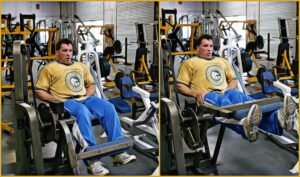
The Strength Sensei on Percentage-Based Training
Why it’s best to let the repetitions determine the load
Many strength and conditioning programs use workout systems based on percentages of an athlete’s maximum results. Charles R. Poliquin was not a fan.
Weightlifting sports scientists in the Eastern Bloc countries popularized percentage-based systems. The components of these systems included volume, intensity, reps per set, rest intervals, speed of lifting, number of exercises, order of exercise performance, training frequency, and training zones. These variables were influenced by how much weight was prescribed. Consider repetitions.
In percentage systems, the amount of weight used for the working (not warm-up) sets influenced the repetitions performed. For example, a weight of 95-100 percent would equal 1-2 reps; 90-95, 3 reps; 85-89, 4-5 reps. Although this system may be optimal for the sport of weightlifting, the Strength Sensei thought it had too many shortcomings for bodybuilding and strength coaching.
First, the Strength Sensei said he didn’t use percentages because each muscle group is characterized by a specific muscle fiber type ratio. (Note: One of his primary references on muscle fiber typing was La Forza Muscolare by Carmelo Bosco, Ph.D.) When training legs, the two major muscle groups are the hamstrings and the quads. The hamstrings contain primarily fast twitch fibers (Type IIb), and the quads primarily slow twitch (Type IIa). Using the leg extension and leg curl with a 90 percent of 1-repetition maximum, a beginner trainee might perform 15-20 reps in the leg extension and 4-6 reps in the leg curl. Note the word “beginner.”
 The quads are primarily composed of slow-twitch muscle fibers and respond better to higher repetitions. (Lead photo by Ryan Paiva, LiftingLife.com; this photo by Miloš Šarčev)
The quads are primarily composed of slow-twitch muscle fibers and respond better to higher repetitions. (Lead photo by Ryan Paiva, LiftingLife.com; this photo by Miloš Šarčev)
As trainees increase their strength, their nervous system adapts such that they cannot perform as many reps with a given percentage. Using our leg extension/leg curl example, after a year of training, the repetition range might change to 12-15 reps for the leg extension and 3-5 reps for the leg curl. The Strength Sensei, incidentally, was primarily a fast-twitch athlete and excelled at using especially heavy weights (closer to 1RM) but struggled with lower percentages.
One of the biggest issues the Strength Sensei had with percentage-based systems is that it prescribed weights that were often too light or too heavy. Many variables determine how an individual will perform on any given day (for example, not getting enough sleep, work stress, illness), and it is impossible to predict the exact weight an individual can lift. This is one reason the Strength Sensei would prescribe a range of reps, such as 6-8, rather than a single repetition.
Percentage-based systems may have their place in the sport of weightlifting, but for physique transformation and general strength training, let the repetitions determine the load. (TSS)
